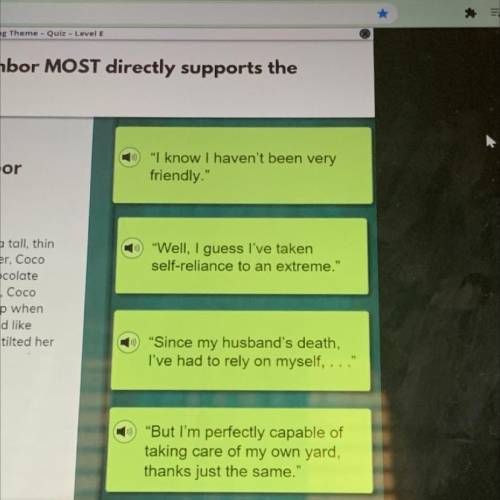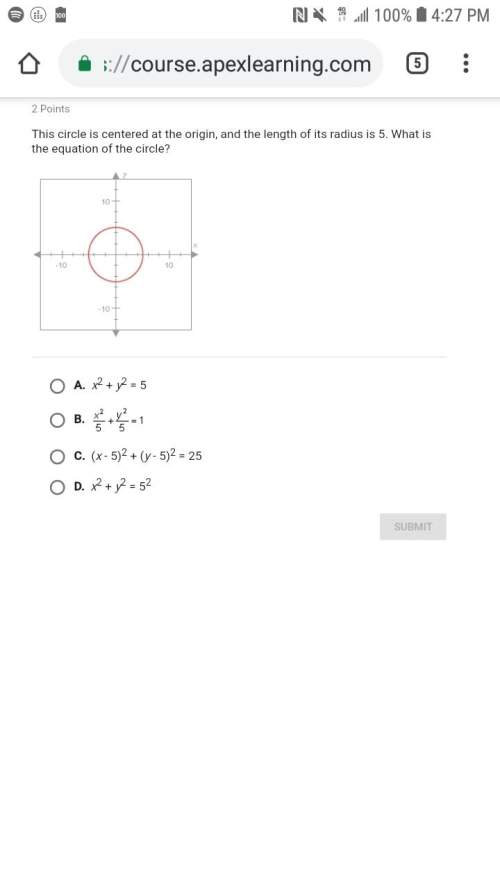
English, 07.06.2021 17:20 MendesMist
Which line from the neighbor MOST directly supports the
theme of the story?
The Reluctant Neighbor
"I know I haven't been very
friendly.
By Clara Bohrod
"Well, I guess I've taken
self-reliance to an extreme."
1 Coco was excited to meet her new neighbor, a tall, thin
woman with elegant gray hair. To welcome her, Coco
and her mother baked their special double chocolate
cookies. As they rang their neighbor's doorbell, Coco
imagined how the woman's face would light up when
she spied the yummy treats. After what seemed like
forever, the door creaked ajar, and the woman tilted her
head to peek through the crack
"Since my husband's death,
I've had to rely on myself, ..."
"But I'm perfectly capable of
taking care of my own yard,
thanks just the same."
1 of 8


Answers: 2


Another question on English

English, 22.06.2019 06:00
He had fished in the river since ten years and he was a good fisherman. he know where to found the slim sliver chilwa fish, a big beautiful mahseer and the long moustache singhara. he know where the river was deep but where it is shallow; he knew which baits to use - which fish like worms and which liked gram. edit the above
Answers: 1

English, 22.06.2019 07:10
What is the biggest difference in central ideas and themes? question 1 options: themes are for stories with characters in them. there is only a central idea if it is explicitly (specifically, outright) stated in a story. central ideas are a main idea specific to the text, while themes are an universal lesson or moral. themes are only found in nonfiction, while central ideas are found in fiction. question 2 (1 point) which of the following is not a true statement about theme? question 2 options: mulitple themes can be found within a single text theme is usually inferred. the theme is always clearly stated by the author or a character. themes should be supported by evidence from the text. question 3 (1 point) what is indirect characterization? question 3 options: all details stated and implied that give the reader information about a character. details such as age, height, or hair color that give the reader information about a character. actions or dialogue said by a character that give the reader information about a character. the description an author gives about the character in the exposition. question 4 (1 point) which sentence best describes lizabeth's development in "marigolds"? question 4 options: lizabeth matures when she recognizes that love is more powerful than hate. lizabeth learns that sympathy and understanding come from recognizing the truth about other people. lizabeth changes her behavior after she recognizes that she needs to be a better example for her brother. lizabeth comes to recognize that the world is too barren to create lasting beauty. question 5 (1 point) how does the resolution of lizabeth's conflict in "marigolds" develop the theme? question 5 options: lizabeth recognizes that she has looked only at herself rather than at other people. lizabeth's destruction of miss lotte's flowers brings about justice over miss lotte's ill-treatment of the children. lizabeth's pursuit of adventure leads her to a more fulfilling life away from the shantytown. the camaraderie of lizbeth and joey creates meaning in both their lives. question 6 (1 point) which of the following quotations best exemplifies lizabeth's childish nature at the beginning of the story? question 6 options: "and one other thing i remember, another incongruency of memory - a brilliant splash of sunny yellow against the dust - miss lottie's marigolds." "by the time i was fourteen, my brother joey and i were the only children left at the house." "'hey, lizabeth,' joey yelled. he never talked when he could yell." "then i lost my head entirely, mad with the power of inciting such rage, and ran out of the bushes chanting madly, 'old witch, fell in a ditch, picked up a penny and through she was rich! '" question 7 (1 point) the story "marigolds" is told in a flashback. lizabeth recounts the details of the incident with miss lottie for the reader years after they have happened. how is this important to the development of lizabeth's character? question 7 options: lizabeth is older now and realizes that she may not have made the best decisions. lizabeth feels sorry for herself now and thinks that miss lottie is still angry. there were so many kids and so little to do, their behaviors should have been overlooked. all of these question 8 (1 point) lizabeth's "world had lost its boundary lines," when she overheard her father crying to her mother. what can we assume about the character of the father because of her reaction to this moment? question 8 options: we can assume that her father is a weak man. we can assume that her father shares his fears with his children and wife often. we can assume that her father is a proud and strong man and that his brokenness is a change in his character. we can assume that until this moment, her father has only cried to lizabeth but not to her mother which explains her surprise.
Answers: 2

English, 22.06.2019 07:30
This excerpt expresses shelleys idea that poetry is factual?
Answers: 3

English, 22.06.2019 14:50
Which sentence best describes the chief characteristics of blank verse? a. it is always made up of eight syllables and never rhymes. b. it is in iambic pentameter and doesn't rhyme. c. it can be in any kind of meter but must never rhyme. d. it is in iambic pentameter and must always rhyme
Answers: 1
You know the right answer?
Which line from the neighbor MOST directly supports the
theme of the story?
The Reluctant Nei...
The Reluctant Nei...
Questions


Biology, 01.11.2021 19:20

Mathematics, 01.11.2021 19:20

Mathematics, 01.11.2021 19:20

Mathematics, 01.11.2021 19:20





Mathematics, 01.11.2021 19:30


Biology, 01.11.2021 19:30

Mathematics, 01.11.2021 19:30

History, 01.11.2021 19:30

Mathematics, 01.11.2021 19:30




Mathematics, 01.11.2021 19:30




